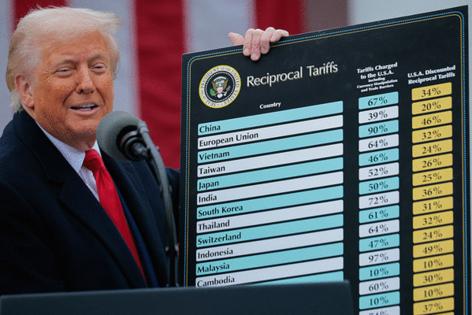Editorial: With Trump stuck on tariff repeat, UK and India make a big, beautiful deal
Published in Op Eds
The greenback sank against the British pound Tuesday as the United Kingdom signed a new, tariff-busting trade deal with India that is a prime new example of how countries around the world can work around the United States and its tariff-obsessed president.
India and the United Kingdom are the fifth and sixth largest economies in the world and India is the world’s most populous nation with nearly 1.5 billion people and a rapidly growing economy. This would appear to be the largest trade deal India has ever made with a foreign nation and certainly the most impactful pact for the U.K. since that nation left the European Union in 2020.
The new bilateral deal, the result of some three years of negotiations by governments of different political flavors, is quite the stunner with an eventual economic impact reportedly as high as £25.5 billion ($34 billion).
Among the highlights: India, which long has been a wielder of protectionist trade policies, has agreed to reduce 90% of its tariffs on trade with the U.K., with some of them now set on a course toward zero over the next decade. Good news for producers of Scotch whisky, for sure, but also for Britain’s luxury automobile makers who long have coveted more of a foothold in the growing Indian economy.
In return, the U.K. has either dropped or greatly reduced tariffs on clothing and other textiles imported from India, as well as on foodstuffs and jewelry. India also has won visa, immigration and social security concessions from the U.K., which has a large population of Indian émigrés. A broader range of Indian nationals (including chefs) now will be able to apply for skilled worker visas, a net gain for both nations.
As with any compromise, not everyone is happy with everything. But by and large, the trade deal is being seen as a big win for both nations.
There’s no question that Trump’s tactics motivated the conclusion of this pact: British Prime Minister Keir Starmer’s Labour government has been pushing the notion that the U.K. should position itself as the adult in the global room, drawing a sharp and politically useful contrast with the volatility and trade incoherence coming from the administration of President Donald Trump. One British business leader told the BBC the new deal was a “beacon of hope amidst the specter of protectionism.”
On Tuesday, Trump was set to meet with the new Canadian prime minister, Mark Carney, a meeting that was taking place against the backdrop of a U.S. president who has threatened Canadian sovereignty on numerous occasions and who has repeatedly said that the U.S. needs “nothing” from its once-friendly neighbor to the north.
The difference in rhetoric has been striking.
On this side of the Atlantic, Carney said in his acceptance speech last week that “America wants our land, our resources, our water, our country. President Trump is trying to break us so he can own us.”
For his part, Trump recently described the Canadian border as an ”artificial line that was drawn with a ruler many years ago.” And that is among his milder pronouncements on Canada. Meanwhile, Trump’s new declarations of intent to subject overseas movie shooting to his list of tariffs have gone down badly in the U.K., where many American movies, such as “Barbie” and “Wicked” have been filmed, resulting in thousands of high-paying jobs.
Compare all that animus to the figurative hug-fest Tuesday between the U.K. and India, with Indian Prime Minister Narendra Modi referring to Starmer as his “friend” and Starmer heralding India as “one of the fastest-growing economies in the world” and saying he planned soon to visit. Even beyond the world of carefully calibrated statements by world leaders, Modi and Starmer clearly have a close relationship that will benefit both nations. It hardly needs stating that India is growing in importance, not just in terms of trade but of national security, given the unsavory alliances being sought and propagated by communist China.
The Trump administration has said it is making trade deals of its own with announcements soon to come. Good. If Trump does not move expeditiously and with a spirit of compromise and cooperation, this great nation will be standing on the sidelines as international trade finds ways to survive and prosper without U.S. help.
___
©2025 Chicago Tribune. Visit at chicagotribune.com. Distributed by Tribune Content Agency, LLC.




























































Comments